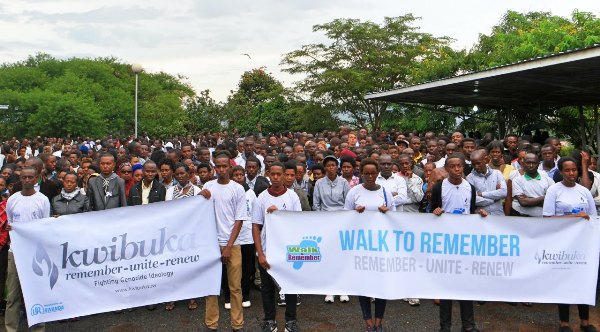
Kigali: Each week, the National Commission for the fight against Genocide (CNLG) sets out striking facts relating to the planning of the Genocide perpetrated against the Tutsi in 1994; below are some of the events that marked the period from March 23 to 28, 1991-1994.
- PRIME MINISTER NSENGIYAREMYE DISMAS DENOUNCED THE DISTRIBUTION OF WEAPONS
On March 25, 1993, Prime Minister Nsengiyaremye Dismas wrote to the Minister of Defense, Dr James Gasana, complaining about the distribution of weapons to the population then underway in the country, in the context of planning massacres under the guise of what it was called “civil self-defense”. As he had done in writing to Defense Minister James Gasana on March 2, 1993 asking him to stop making the list of those whom Habyarimana called the accomplices of the Inkotanyi, in the same way he denounced the distribution weapons to the population and military training for them. The population was trained to later kill the Tutsi.
The same day, Prudence Bushnell, then United States Under-Secretary of State for Africa, met with President Habyarimana in Kigali. He urged him to quickly establish a transitional government and expressed his country’s concerns over the upsurge in violence in Rwanda. On the same day, Habyarimana opposed the formation of a transitional government.
On March 26, 1994, Romeo Dallaire asked the United Nations to provide an emergency plan to provide assistance when needed.
- THE MINISTER OF DEFENSE AND HIGH MILITARY OFFICERS WARN UNAMIR THAT THERE WILL BE A GENOCIDE TO BE FINISHED IN 15 DAYS
Minister and senior military officials warn UNAMIR that genocide could be completed in two weeks.
On 5th May 1994, in a statement before the Belgian military prosecution, investigating the murders of ten Belgian peace keepers, Lieutenant-Colonel Jacques-Albert Beaudouin who had been in Rwanda as adviser to Rwandan Chief of Defence Staff G3 General Gratien Kabiligi, said he had heard Rwanda’s Defence Minister Gen Augustin Bizimanapublicly state that there would be genocide, if the RPF did not halt the war:
“a month or two before the attack, I attended an evening at General Nsabimana’s house, with the Belgian ambassador, Colonel Vincent, Colonel Marshal (UNAMIR), Colonel Le Roy, President Habyarimana, BIZIMANA (MINADEF) and a few Rwandan officers. In fact, on this occasion, it appeared or rather it was reaffirmed that ARUSHA could not be accepted by Rwandans. BIZIMANA told me, after a few glasses of champagne, that he was ready to engage the Rwandan army if the RPF did not play the game.
Ten days before the attack, on the last Friday of March, Colonel Vincent [Head of the Belgian Military Cooperation in Rwanda] invited General Nsabimana and G3 Colonel Kabiligi to his house and at that meeting they still clearly asserted that Arusha was not possible, that eventually they would accept early elections and that if they wanted to impose ARUSHA, they could eliminate the RPF and the Tutsi and it would take a maximum of two weeks. They seemed safe from them”.
- Ferdinand NAHIMANA ASKED THE HIGH AUTHORITIES TO COLLABORATE WITH LOCAL AUTHORITIES TO MOBILIZE THE POPULATION TO COMMIT GENOCIDE
On March 28, 1994, Ferdinand Nahimana circulated to members of the elite his “self-defense” proposal, previously circulated in February 1993, and requested that suggestions be made to provide a “final solution” to the problems at hand. In it, he called for national unity, condemned the “Tutsi league” in his intention to create a “Hima empire” and urged the elite not to remain “unaffected”, but to work with local administrators to alert the population to the dangers of war.
- THE DIPLOMATIC CORP CALLED ON PRESIDENT HABYARIMANA TO APPLY THE PEACE AGREEMENTS.
On March 28, 1994, Habyarimana again opposed the establishment of the transitional government.
Solemn appeal of the diplomatic community, gathered at the French Embassy, in favor of the application of the peace agreements, signed by J.-R. Booh-Booh, the Apostolic Nuncio and the ambassadors of France, Belgium, the USA, Germany, Tanzania, Zaire, Uganda and Burundi. ]
The undersigned request the Governement of Rwanda to settle their differences and to apply the agreements. They demand that all the political parties approved in Rwanda on the date of signing of the power-sharing protocol and the RPF be represented in the transitional institutions. They recommend the establishment of a commission on National Unity and Reconciliation which will ensure that each party respects the principles of the code of political ethics.
CONCLUSION
A few weeks before the outbreak of the Genocide against the Tutsi, Habyarimana and senior military officials publicly stated that they were going to exterminate the Tutsi and that they were opposed to the implementation of the Arusha peace accords.
The diplomatic community tried to convince Habyarimana to apply the peace agreements, but he showed them that these agreements had no value and warned them that he was ready to commit the Genocide. (Fin)
